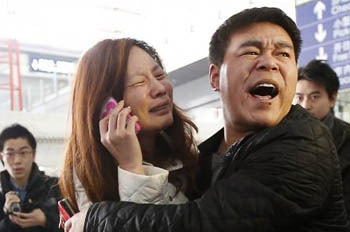![]()

Beijing/Kuala Lumpur, Mar 8: A Beijing-bound Malaysian Airlines plane that went missing with 239 people on board, including five Indians, today crashed into waters off Vietnam's southern Phu Quoc Island, Vietnamese media reported.
The Boeing 777-200 Flight MH370 with 227 passengers and 12 crew members on board crashed 250 km off coast of Tho Chu island, Vietnamese newspaper Tuoi Tre (Youth) quoted Rear Admiral Ngo Van Phat, political commissar of the Fifth Naval Region of Vietnam, as saying.
A fresh passengers' list issued by the airline said five Indians were among the 239 passengers on board the aircraft, correcting its previous account in which Indians were not mentioned.
"At the moment, there are no Vietnamese navy boats in that area so we have to ask boats from Phu Quoc island to be prepared for rescue," the admiral said.
From the report it was not clear how the admiral knew about the crash or whether the wreckage of the ill-fated plane has been located.
There is no confirmation about the report from the Malaysian authorities.
Chinese media is reporting the plane may have crashed into the South China Sea, state-run Xinhua news agency said.
The plane took off at 12:41 a.m. (local time) and lost contact with Subang Air Traffic Control near Kuala Lumpur almost two hours later at 2:40 a.m, the airlines said.
The fresh list of passengers issued by the airline mentions people of 14 nationalities including Indians.
The plane disappeared in the night somewhere over South China Sea while enroute to Beijing from Kuala Lumpur.
"Focus of the airline is to work with the emergency responders and authorities and mobilize its full support," the Malaysia Airlines CEO Ahmad Jauhari Yahya earlier said.
He said the pilot of the missing aircraft, identified as Capt. Zaharie Ahmad Shah, had 18365 hours of experience and joined the airlines in 1981.
Those on board include 5 Indians, 152 Chinese, 38 Malaysians, 7 Indonesians, 6 Australians, 3 French, 4 including an infant from the US, 2 New Zealanders, 2 Ukrainians, 2 Canadians, 1 each from Russia, Italy, Taiwan, Netherlands and Austria.
Malaysia Airlines is currently working with the authorities who have activated their Search and Rescue team to locate the aircraft, Jauhari said.
"Our team is currently calling the next-of-kin of passengers and crew," he added.
Confusion and chaos prevailed in Beijing where the planed was due to land at 6.30 AM.
Relatives of the 152 Chinese passengers rushed to the airport and later the Malaysian Airline office to find about the fate of their near dear ones.
A passenger manifest originating from China which has been circulating online and also published by Star online mentions the Indians along with their passport numbers.
The names include Chetna Kolekar, Swanand Kolekar, Suresh Kolekar, Chandrika Sharma and Prahlad Shirsatha. One Indian-origin Canadian Muktesh Mukherjee was also on board.
Malaysian authorities continued to state that a massive search and rescue operation was on and no wreckage had been sited so far.
The plane was cruising at 36,000 feet when it is reported to have crashed.
Sources told the New Straits Times that assets from the Malaysian Maritime Enforcement Agency, Royal Malaysian Navy and Royal Malaysian Air Force had been deployed to the area for a search and rescue mission this morning.
"It was presumed that the flight might be somewhere 100 nautical miles east of Kota Baru and 120 nautical miles southern of Vietnam's tip," an unnamed source said.
Meanwhile, two Chinese maritime rescue ships have left to the South China Sea to help in rescue work.
Malaysian Prime Minister Najib Razak has instructed all the relevant authorities to take immediate measure in identifying the missing aircraft.
Malaysian Defence Minister Hishammuddin Hussein said he has instructed all relevant agencies including TUDM (Royal Malaysian Air Force) to work together (in) locating the plane.
The aircraft came into service in 2002. Malaysia has 15 Boeing 777-200 series.
Earlier, Vice President operations control Fuad sharuji said the airlines had got in touch with five of its flights in air to see if they had heard from the missing plane but they had got no response.
Several ATC of nearby countries had also been contacted by the airline, Fuad said.
The aircraft had a Code share with China southern airline. The plane had entered Vietnamese airspace when it lost control.
Chinese ships and aircraft are on standby to locate and rescue the missing Malaysian plane carrying more than 150 Chinese passengers to Beijing.
Chinese Minister of Transport Yang Chuantang announced the launch of the highest-degree emergency response mechanism.
The ministry is closely observing the situation and actively coordinating with domestic as well as maritime rescue authorities and civil aviation administrations in Malaysia and Vietnam, Xinhua quoted him as saying.
Eight ships belonging to the Nanhai Rescue Bureau and the Hainan Maritime Safety Administration are waiting for orders. An aircraft fleet is also ready to take off, he said.





Comments
Add new comment